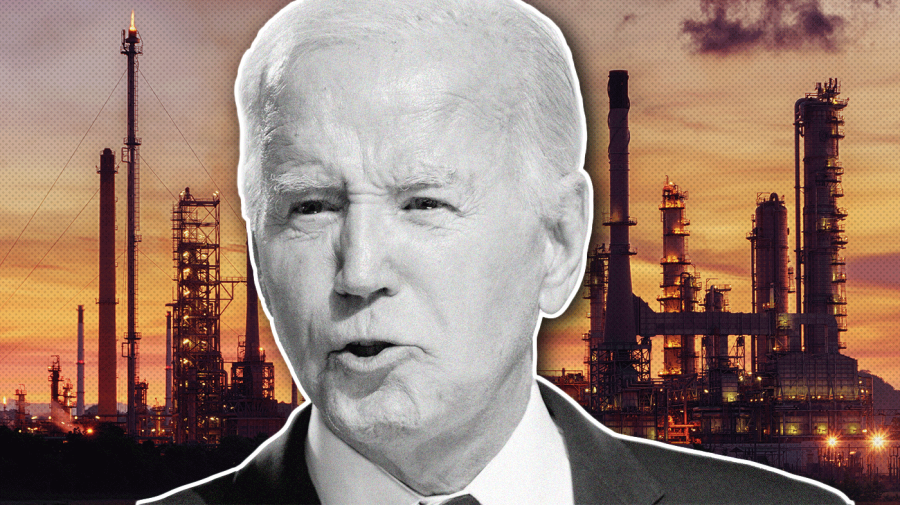Biden walks political tightrope on US oil boom

As U.S. oil production booms, President Biden finds himself on a tightrope between courting moderate voters and maintaining enthusiasm among progressives.
Domestic oil production is projected to hit record highs this year. That fact could be used to parry Republican attacks on the administration’s energy agenda as Biden seeks reelection, but putting too much emphasis on it could also alienate the climate-minded voters who make up the Democratic base — and who already have mixed feelings about Biden’s energy record.
Simon Rosenberg, a Democratic strategist, said the Biden campaign should not tout the fossil fuel production per se, but rather push back on Republican messaging about the president’s policies causing higher energy prices.
“I think it’s critical for the campaign to aggressively rebut all of these zombie attacks that exist on Biden, including that he’s waged war on American energy,” Rosenberg said. “Everything the Republicans have been arguing about Biden in terms of energy policy is completely false and wrong, and we should rebut it.”
Throughout Biden’s presidency, Republicans have accused his administration of “waging war” on U.S. energy production and raising gas prices.
The Biden administration has placed some restrictions on drilling. These have included an initial pause on new auctions for the rights to drill on publicly owned lands, a rule requiring oil and gas producers on public or private land to cut their methane emissions, and a plan that offers companies fewer chances than before to acquire the rights to drill offshore.
It has approved some drilling projects, however, notably including the massive — and controversial — Willow Project in Alaska.
And despite the restrictions it has put in place, the administration has also overseen an increase in domestic oil production. This week, oil production for 2024 was forecast to hit a record 13.2 million barrels per day, compared to roughly 12.3 million barrels per day in 2019.
Tom Kloza, global head of energy analysis at the Oil Price Information Service, said that the U.S. is seeing higher production levels even in nontraditional oil production states like New Mexico than in Angola, which just left the Organization of the Petroleum Exporting Countries (OPEC).
“That means the U.S. is leading the charge of additional non-OPEC oil that’s diminishing the market share for Saudi Arabia and most of the traditional OPEC members,” Kloza said. “In the U.S. it’s gangbusters, and in Canada it’s gangbusters as well.”
The extent of Biden’s role in this boom is minimal: Only a small portion of American energy production actually comes from public lands and offshore waters, with most occurring on private lands that are controlled by private companies. Some of the administration’s efforts to restrict drilling have also been blocked by the courts.
And gasoline prices are even farther outside of the government’s control: Factors including global oil production, seasonal demand cycles and activity at plants where that oil is turned into gasoline have a much more significant impact on the price tag at the pump than presidential policy.
The U.S.’s high oil production could be a tool for helping the Biden administration and Democrats combat the GOP’s rhetoric, however.
“My instinct is that the campaign will be more aggressive about rebutting the ‘war on energy’ attack because it’s so central” to Republican messaging, Rosenberg said.
The argument “wasn’t just about oil production, it was that Joe Biden caused high gas prices … it’s critical that they lean into this and take control of this in the coming months,” he added.
Sen. John Hickenlooper (D-Colo.), a proponent of fracking and oil and gas development in his state, expressed similar sentiments.
“I’m not going to tell the president what he should be talking about … but I’d throw the question back, if there’s been such a war on energy, how did we set a record last year for oil and gas?” Hickenlooper told The Hill.
However, too much emphasis on high production under Biden could alienate the progressive segment of the president’s base, which has sought limits on oil production because of the fuel’s contribution to climate change.
The administration is already in a precarious position with progressive voters over issues including the war in Gaza and immigration — as well as its approvals of fossil fuel projects.
Facing this complicated political landscape, the Biden administration has been relatively quiet on oil production. It has cheered recently falling gasoline prices, however.
“Americans in thirty states are now paying under $3 a gallon to fill up their tanks,” Biden tweeted this week.
Though gas prices are low right now, amid factors including low winter demand for oil, Republican strategist Keith Naughton said he still thinks energy is a strong issue for the GOP.
“Energy’s always been a good issue for Republicans against the Democrats because they do have a confused policy,” said Naughton, who is also an opinion contributor for The Hill.
“I do think it makes a lot of sense for Republicans to push it forward because it does cause issues within the Democratic coalition.”
But he said that when it comes to energy issues he ultimately thinks voters will be swayed by whatever the price is at the pump in November.
They will make a judgment “based on what’s coming out of their pocket,” Naughton said.
For the latest news, weather, sports, and streaming video, head to The Hill.
